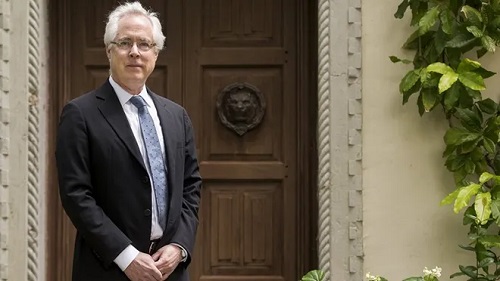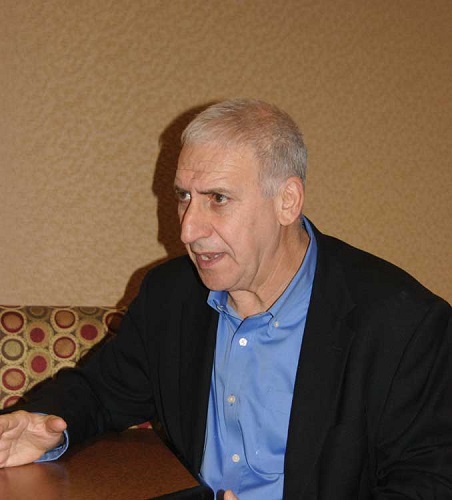De Amerikaanse schrijver en letterkundige Louis Menand werd geboren op 21 januari 1952 in Syracuse, New York. Zie ook alle tags voor Louis Menand op dit blog.
Uit: The War On Chaplin (The New Yorker, 20 Nov. 2023)
“Chaplin’s run of silents continued into the talkie era. Two of the most iconic silent movies ever made, “City Lights” (1931) and “Modern Times” (1936), were made long after the shift to sound. Chaplin gambled that there was still an audience for silent movies. He also knew that once the Tramp spoke he would cease being an Everyman and become merely an Englishman.
Those films embodied, for many people, a distinctive attitude toward life in the twentieth century. City Lights became the name of the San Francisco publisher that put out Allen Ginsberg’s “Howl” (1956) and other dissident works; Les Temps Modernes was the name of the intellectual journal founded in Paris in 1945 by the existentialists Jean-Paul Sartre and Simone de Beauvoir. The Tramp was evoked during the Berkeley Free Speech Movement in the nineteen-sixties and the Solidarity movement in Poland in the nineteen-eighties. The Tramp stood for the Individual against the System.
In 1940, Chaplin made his first talkie, a satire of Hitler and Mussolini called “The Great Dictator.” It was a huge hit. And then the sky fell. The country, or a very noisy part of it, turned against him, and eventually, after a decade of critical and political abuse, Chaplin left the United States, cashed out his American assets, bought a house in Switzerland, and did not return for twenty years.
That was in 1972, when Chaplin was eighty-two and frail. He came back to accept an honorary Oscar, and was greeted with a twelve-minute ovation, said to be the longest in the history of the Academy Awards. By then, accusations that had once been damaging—of sexual libertinage and Communist sympathies—had lost most of their force.
Still, even for people who were not around when the reputational crash occurred, the shadow of the old charges lingered. The image of Chaplin the man had become virtually the inverse of the Tramp’s: oversexed, ungenerous, anti-American. Scott Eyman’s “Charlie Chaplin vs. America” (Simon & Schuster) is an attempt to explain what happened.
The story is not new. Sadly, it’s not old, either. As Eyman says, it “eerily foretells the homicidal cultural and political life of the twenty-first century.” Chaplin was set upon by the mid-century equivalent of social media—newspaper columnists—and was targeted by a “weaponized” government agency, the F.B.I.
Chaplin’s chief antagonists among the columnists—whose audiences, in the days before television, were considerably larger than the audiences today for Fox News and MSNBC—were gossip columnists like Hedda Hopper and Walter Winchell (who also had a weekly radio show heard by twenty million people) and anti-Communist flamethrowers like Westbrook Pegler and Ed Sullivan, a vigorous enemy of subversives before he became defanged by serving as the man who introduced the Beatles to America. The proximate cause of Chaplin’s exile was the cancellation of his reëntry permit by Harry Truman’s Attorney General after Chaplin had taken his family on a trip abroad.”

De Amerikaanse dichter en letterkundige Edward Hirsch werd geboren op 20 januari 1950 in Chicago. Zie ook alle tags voor Edward Hirsch op dit blog.
De wijder wordende hemel
Ik ben zo klein als ik over het strand loop
’s nachts onder de steeds wijder wordende hemel.
Het natte zand versnelt onder mijn voeten
en de golven donderen tegen de kust.
Ik beweeg me weg van de promenade
met zijn kleurrijke slingers van mensen
en de hotels met hun knipperende lichten.
De wind zucht honderden kilometers lang.
Ik verdwijn zo ver in het donker
Dat ik uit het zicht ben verdwenen.
Ik ben een kleine zeeschelp
die in het geheim aan land is gedreven
en het geluid draagt van de oceaan
die door zijn lichaam stroomt.
Ik ben zo klein dat niemand mij kan zien.
Hoe kan ik vervuld worden met zo’n enorme liefde?
Vertaald door Frans Roumen

Zie voor nog meer schrijvers van de 21e januari ook mijn blog van 21 januari 2022 en ook mijn blog van 21 januari 2019 en ook mijn blog van 21 januari 2018.
